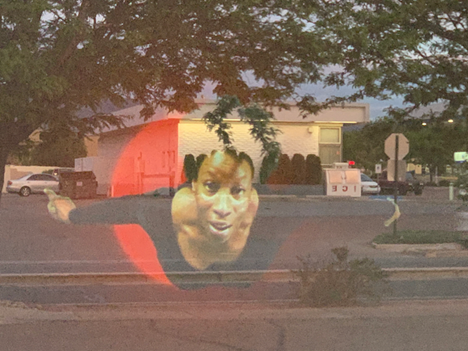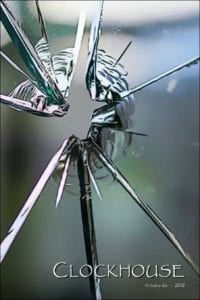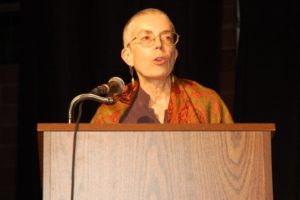
Clockhouse, the national literary journal published by the Clockhouse Writers’ Conference in partnership with Goddard College, is extremely pleased to announce the publication of Volume Five and to offer a few excerpts here.
We hope you’ll visit the Clockhouse website for a further glimpse of Volume Five contents, to purchase copies, and to find information about submitting to Clockhouse Volume Six during the next submissions period, which will run from August 15 through December 1.
from Holly Karapetkova’s La Bestia:
As many as half a million Central American immigrants annually hop aboard freight trains colloquially known as “La Bestia,” or the beast, on their journey to the United States.
—Rodrigo Dominguez Villegas, MigrationPolicy.org
On its back they are coming
San Pedro Sula
San Salvador
tracks split like a cracked jaw
Guatemala
Distrito Central
chokepoint
La Bestia ripping the night open
2000 miles
fever and rust
a thousand, a hundred thousand
coming
from Ira Sukrungruang’s Because, the Ferguson Verdict:
Because, in 1978, we were the first Thai family in a working class neighborhood of Chicago, predominantly inhabited by Polish and Irish. Because we found our mailbox off its post every weekend, the aluminum dented in the shape of a baseball bat. Because rotten eggs splattered the white siding of our bi-level, which my mother scrubbed until she could see the pale of her face. Because someone scrawled on our driveway, Chinks Go Home, in shaving cream that stained and stayed on the concrete for weeks. Because at the tile factory off Archer Avenue my father got into a fight. Because a co-worker said he talked funny, and he was tired of everyone telling him he talked funny, and so he punched the offender in the face, who was as white as some of the floor tiles the factory churned out. Because we owned a gun, a heavy silver one with a leather handle, a safe guard against anyone out to do us harm. Because we believed everyone was out to do us harm. Because my father chased two boys away with the gun one night, his splayed feet slapping the concrete, his voice screaming obscenities until he was hoarse. Because those boys kept ding-dong-ditching our home till past midnight. Because we called the police and they never showed. Because I was four and endlessly crying, and my mother couldn’t shush me, so she pressed me hard to her chest, so hard my nose bled. Because a year later I found the gun in my father’s briefcase of important things, and I picked it up and pulled the trigger and nothing happened, but in my brain there was a bang that silenced robins.
from Aimee Liu’s Folio Note, Revenging with Beauty:
Directly and indirectly, this folio was inspired by Music of Strangers, the 2016 documentary that chronicles the passion and vitality of the musical experiment known as The Silk Road Ensemble. Founded by cellist Yo-Yo Ma seventeen years ago and named for the ancient trade route linking Asia, Africa and Europe, this international collective today consists of more than fifty instrumentalists, vocalists, composers, arrangers, visual artists and storytellers. They gather in locations around the world to explore the ways that art can both preserve global artistic traditions and shape cultural evolution. In the film, these artists share not only their extraordinary talents but also their personal stories of struggle and of the power of creative community to help individuals overcome trauma, political oppression, and cultural decline.
Wu Man, a Chinese pipa player, survived China’s Cultural Revolution. Kayhan Kalhor, an internationally celebrated kamancheh player, was forced into exile after the Iranian Revolution. Others endured tragedies of a more familial or physical nature, yet all found their way forward through music, through art, through words and acts of creativity that induce not violence, but radiance. The essence of their experience is summed up in the film by one resonant line: “When someone or something tries to kill the human spirit, the answer of the human spirit is to revenge with beauty.”
What a thought. What a radical departure from the barrage of invective and accusation that currently dominates America. What heartstruck and deeply earned wisdom.
After first viewing the film last summer I was buoyed by a sense of emotional ignition, which has persisted despite a series of personal losses in my own life, on top of the national chaos of the intervening months. Over and over I’ve returned to that line—The answer of the human spirit is to revenge with beauty, and I’ve pondered one word in particular: revenge.
Ordinarily this word is used to signal retaliation through vengeance, injury for injury, eye for an eye and all that. To revenge is to punish, but it’s also to answer force with force, to repay defeat with victory. To triumph, unbowed, in the end.
To revenge with beauty is not to surrender or turn the other proverbial cheek. The idea instead is to change the arsenal of weapons with which we respond to trauma, injustice, and loss. We have the power to transform fear and anguish into hope through art, joy, and shared humanity. To revenge with beauty is to triumph through love in the toughest, strongest, most bad-ass sense of that radiant word.
from Diana Wagman’s: Small World
Becky was a thin, polite woman who always brought salads in Tupperware for lunch and went to Pilates classes after work. Karen watched her lick her fingers and pick up a third donut. The world was going to hell.
By three o’clock in the afternoon, she had seen a dozen emergency patients. Including but not limited to a woman who had gotten out of her friend’s car while it was moving because he had voted for the Green candidate; a 19-year-old boy—first time voter, he announced, and last time too—who had taken all his mother’s thyroid medication hoping to calm down and needed his stomach pumped; and an older man with a light bulb up his rectum. “Trying to illuminate the shit.”
The waiting room was full. She could work the rest of her shift, then an extra, and another and another, and never be done. Maybe that was the thing to do. The way to help. The way forward. Just keep working no matter what. The machines beeped. The curtains opened and closed and scraped along the tracks. The patients moaned. Their families cried. Another hour and Karen would go home and Bronson would ask what happened today. How could she tell him nothing when everything was the answer? He sat at home waiting for his agent to call, for kitty litter or cold medicine or a luxury pickup truck to want his handsome face. For him, while he lifted his weights, watched that Paul Newman movie again, built another new bench for the backyard, it was all the same. At the hospital everything was different. Tenuous. Out of kilter. As if they were no longer standing on solid ground—the hospital perched at the center of a seesaw, too much weight in either direction it would tip over and they would all roll off. She knew that’s what that man in Washington and all his cohorts wanted. Bye-bye inner city Los Angeles hospital. Bye-bye to the homeless, the gunshots, the overdoses, the immigrants, the uninsured. Tumble down and don’t get up.
from Richard Chin’s 137th Street:
NICK
You know, Autrey had his two little daughters with him on that day. They were 4 and 6. He left them on this platform when he jumped down there.
ALEX
Really? I didn’t know.
NICK
Surprising, isn’t it? If you were a biologist, that would be the hardest part to explain, him leaving his kids to save a stranger.
ALEX
What do you mean?
NICK
It doesn’t make evolutionary sense. Say that’s the way you were wired, that you had a gene that made you spectacularly unselfish. So much so that you were willing to risk your life to save another. Good for you. But the problem is, because you’re so likely to throw your life away being a hero, you diminish your chances of surviving to reproduce. You reduce your chances of passing that heroic gene on to others. That is unless the people you’re rescuing are close relatives, people who share the same genes as you. That’s why a biologist would joke that he wouldn’t risk his life to save a drowning stranger, but he would lay down his life for two brothers or eight cousins. Yet here was Autrey, a middle-aged father, willing to sacrifice his own life for a stranger, even putting his own children at risk at the same time. It doesn’t make sense, does it? It’s not logical, is it?
ALEX
Fuck logic. Maybe he was just a really decent dude. A stand-up guy.
NICK
Yeah. Maybe. There are studies that show that rescuers are more empathetic, more optimistic, more hopeful. Principled risk takers, they call them. Men are more likely to jump into icy water or run into burning buildings than women. But when it doesn’t involve physical heroics, when it came to hiding Jews during the Holocaust, women were just as likely to risk their lives as men. But it’s rare in any case. Most of us just stand by. It’s extreme behavior by definition. (beat) Some experts say that heroes share traits with psychopaths.





